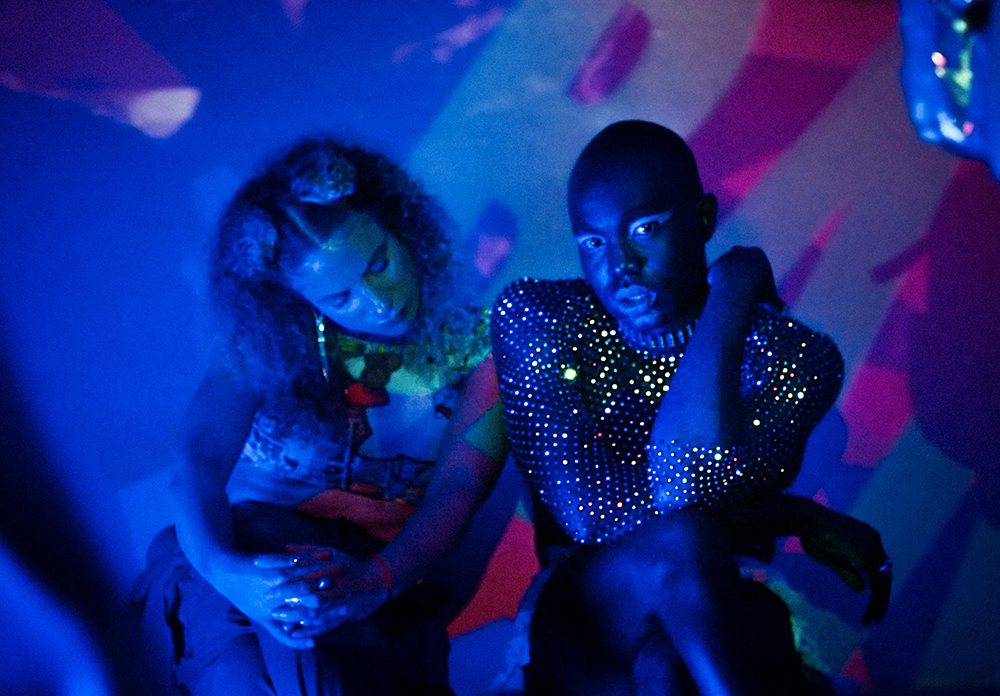So far at this year’s SXSW—held virtually due to Covid—the various shorts competitions have shown some wonderful and visually appealing offerings. I previously reviewed two such films: “The Mohel,” an introspective look at Judaism, financial strife, and culture, and “Play it Safe,” a racially insightful short that has subsequently won a Grand Jury Award at SXSW.
Shorts have always been an enticing medium for me. They deal with the same struggles that feature films have: they must entertain, they must inspire, and they must confront all the same narrative hurdles, but do so in a constrained amount of time. It’s nice to see a festival as large as SXSW put such a strong focus on the short program; and given the reactions in the live chats with the filmmakers, festival-goers are enjoying these films as well.
Day 4 at SXSW brings us two exciting shorts: “Femme,” by directors Ng Choon Ping and Sam H. Freeman, and “Plaisir” by Molly Gillis. Both deal with strong elements of personal fulfillment and LGBTQ+ issues that are handled with deftness and empathy. I look at both films and their impact below.

I’ll first start with “Plaisir,” which follows a young American woman named Eleanore (Eleanore Pineta), who takes refuge on a farm-like plantation in France. She’s picked up at the train station by her escort, Sophie (Sophie Amieva), and the filmmaking and cinematography quickly catapult us into the proceedings. Eleanore’s French is poor, and Sophie speaks little-to-no English. But we quickly see that this is not an issue; Director Gillis wishes to immerse us into “Plaisir’s”world. Plaisir means ‘pleasure’ in French. This film is an homage to that concept; and, like the concept many Americans are familiar with, focuses on its pursuit, even if attaining it requires more introspection than some would often like.
What I liked about this short was its intermittent use of subtitles. Yes, you can stream the film in Closed Captioning, but should you have the choice it’s almost better not to. Some scenes are subtitled in English (such as direct statements that Sophie makes to Eleanore that we must understand), but others are not. One fo the most beautiful scenes in the short takes place as Eleanore eats under the fading French sun with other people at the commune she has been assigned to work. They chatter in French while she looks on in befuddlement. But she tries to learn, mimicking eating patterns, customs, etc. Beauty is a running theme in “Plaisir” and both Gillis and cinematographer Melanie Akoka treat the material with deference and joy.
Being an LGBTQ+ themed-film, “Plaisir’s” greatest achievement is that it treats the material objectively, and without that ‘othering’ lens that so many films must do in order to make a statement. We glean that Eleanore is likely gay; but homosexuality is not the point of this film, but personal acceptance. Eleanore’s attraction to Sophie is handled mostly through facial acting and glances. And though unrequited (this much is given away in the film’s description, so no spoiler), even that is handled with a grace that is rare for films these days. The scene where this is presented is awkward—similarly to how a boy would feel awkward should a girl he secretly loves rebuke his offer for a kiss—and all we are allowed to see is these people’s souls and desires. “Plaisir” makes it clear it is about acceptance and growth; labels have no place in this film, and presents a utopia one can only hope will one day become a reality across the world.
Apart from this, the French countryside is painted lovelily, and the acting by both Amieva and Pineta is pleasing. There’s several likable elements—such as a meditative dance sequence done by Amieva—and some cross cultural bonding that is awe inspiring to see. But not to be outdone, Gillis grounds her film in the spiritual. The closing shots of the film are beautiful and breathtaking. It asks not just Eleanore but also the audience to close their eyes and ponder what life would be like without any rules, labels, or expectations, but only to be comfortable with our naked self. “Plaisir” is a decidedly good film, and well worth the watch before SXSW closes tomorrow.
Next up is “Femme,” a LGBTQ+ film of a different beast that is interested in personal identity, fitting in, and, strongly, the labels and dangers people in the gay community undergo on a daily basis, often unbeknownst to the rest of the world. The film follows a homosexual man named Jordan (played with a sublime skill by Paapa Essiedu), and a night of horror that unfolds as he gets into a car with a drug dealer as he and his friends try and score some some drugs for their night out at a trendy dance club.
There are subtle and then not-so-subtle elements in “Femme” that make it a stellar picture to behold. There’s the cautioning of several of Jordan’s friends within the nightclub urging him to be careful, and not get tied up with certain patrons. There’s the flamboyant dress of Jordan and others, which allows them to fit into their niche but stick out elsewhere. And then there’s the need of the group for party drugs, which puts them in proximity of a drug dealer out of their element (Wes, played by Harris Dickinson, “Beach Rats”/”County Lines”). Harvey’s flirtatious nature leads Jordan to get in the car with him thinking of scoring drugs, but maybe something else. He ignores his friend’s warnings, and things soon spin out of control.
“Femme,” on its underbelly, deals with the abject uncertainty many in the gay community feel when venturing out of the comfort zone and safe spaces for any reason. There’s a palpable fear for even straight folk when coming on to someone they feel attracted to; but that fear is amplified in “Femme,” for obvious reasons. Where a heterosexual man or woman likes someone who doesn’t like them back, verbal rejection is usually the response. But, as seen in Jordan, rebukes for coming on to the wrong person can lead to physical violence that can often catapult into a fight for you life. Why can’t someone from the straight community rebuke an unrequited advance from someone in the gay community with a simple ‘no,’ as is so often the case among opposite sex couples instead of resorting to hate and intolerance? I’ll never understand, but this is what “Femme,” directed to perfection by Ng Choon Ping and Sam H. Freeman, personify.
To some, the end of “Femme”—open to interpretation—might be too forceful for some viewers…but it ought to be. The film ends in an introspective way, looking into Jordan’s eyes, at his fear, his whole being. The film wouldn’t be the same without Essiedu, but one can’t help but glean the parallels the filmmakers are making here. ‘Femme’ translates from French to English as ‘woman;’ Jordan’s story, including physical abuse and violation of consent are applicable across the board. Toxic masculinity takes many forms, and one can only hope “Femme” will open empathetic eyes to the very real struggle of so many every day.
*”Femme” and “Plaisir” are playing through Sunday, March 21st until 1 AM CST for SXSW ticket holders and press.

